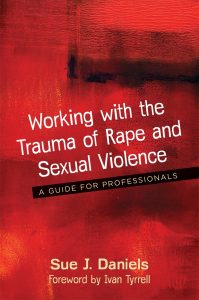 Sue J. Daniels, a therapeutic counsellor and author of Working with the Trauma of Rape and Sexual Violence, discusses the top 20 do’s and don’ts for working with survivors of sexual violence.
Sue J. Daniels, a therapeutic counsellor and author of Working with the Trauma of Rape and Sexual Violence, discusses the top 20 do’s and don’ts for working with survivors of sexual violence.
I remember the first client I ever saw; she was an ex-heroin addict who had been sexually violated by her brother when she was eleven years old. That particular client session was twenty years ago now, and I still remember her to this day.
The client told me that it wasn’t until she was fifteen that she realised what her brother did to her wasn’t normal. Before then, she only knew that she felt uncomfortable and that she didn’t like it but because she loved him she accepted it. During a school biology lesson she had a light bulb moment that it was wrong; so very wrong. After many years of drug addiction and self-sabotage, it took a further twenty years for her to fully disclose what had happened when she engaged in therapy for the first time.
When a person has been raped or sexually violated in any way, they can often live in their own private hell, unable to speak or recall their experiences easily. Having a trained professional to listen, with both their ears and their heart, can be priceless to that individual and is the beginning of healing and restoration for that person.
Every week we get calls from counsellors, policing teams, support workers and other professionals asking for information and/or advice about working with rape and sexual violence, so I’ve put together the following information to answer some of the questions previously asked:
Top 20 List of Do’s and Dont’s for Working with Survivors of Sexual Violence
1. Do – listen, believe and acknowledge.
2. Do – undertake the correct training for working with trauma.
3. Do – always have a sincere, empathic response and complete client focus.
4. Do – have a robust signposting list for additional practical support.
5. Do – have regular line management or clinical supervision.
6. Do – always be aware of your own limits for working with this fragile subject.
7. Do – have a terms and conditions or contractual agreement in place.
8. Do – remember that every person is unique and reacts differently.
9. Do – provide a safe, confidential and boundaried space to allow disclosure.
10. Do – take good care of yourself, watch for burnout and vicarious trauma symptoms.
11. Don’t – engage with traumatic content that you are not trained to work with.
12. Don’t – impose your own beliefs or judgements on a client/patient/service user.
13. Don’t – blame, accuse or give your opinion about choices made.
14. Don’t – make promises that you cannot keep.
15. Don’t – leave a client/patient/service user emotionally unsafe.
16. Don’t – break confidentiality about what you have been told, without consent.
17. Don’t – expect one treatment approach to work for every individual.
18. Don’t – expect clients to work to your speed – let them set the pace.
19. Don’t – be inconsistent or impatient with a client’s progress.
20. Don’t – be disrespectful or abuse a client/patient/service user’s trust.
In the two decades that I’ve been privileged to work with each and every client, I’ve been continually surprised at the bravery and courage often shown. But working with people long-term who have been traumatised by rape and sexual violence, or those who have survived childhood sexual assault, can be exhausting to say the least. It has certainly made me question humanity over and over again and why I didn’t choose an entirely different path.
There are times when I think I’ve heard the very worst defilement that one person can bestow upon another; the shock of some content multiplies with disclosures such as fathers wearing animal masks as they raped their toddler daughters or recollections of mothers sexually assaulting their children under the guise of personal hygiene cleansing rituals. For those working on the frontline, this work is demanding and requires professional boundaries of steel in order to assist those in need of release, recovery and restoration.
Although working in this field undoubtedly has a shelf life, it is important to remember that it is also rewarding, joyous and often profoundly moving to see those who have been affected by sexual violation move on with their lives. I can’t put into words how it makes you feel when you see those affected with a new hope as the impact of the trauma is safely lessened, and for their futures to be finally available to them and to their families.